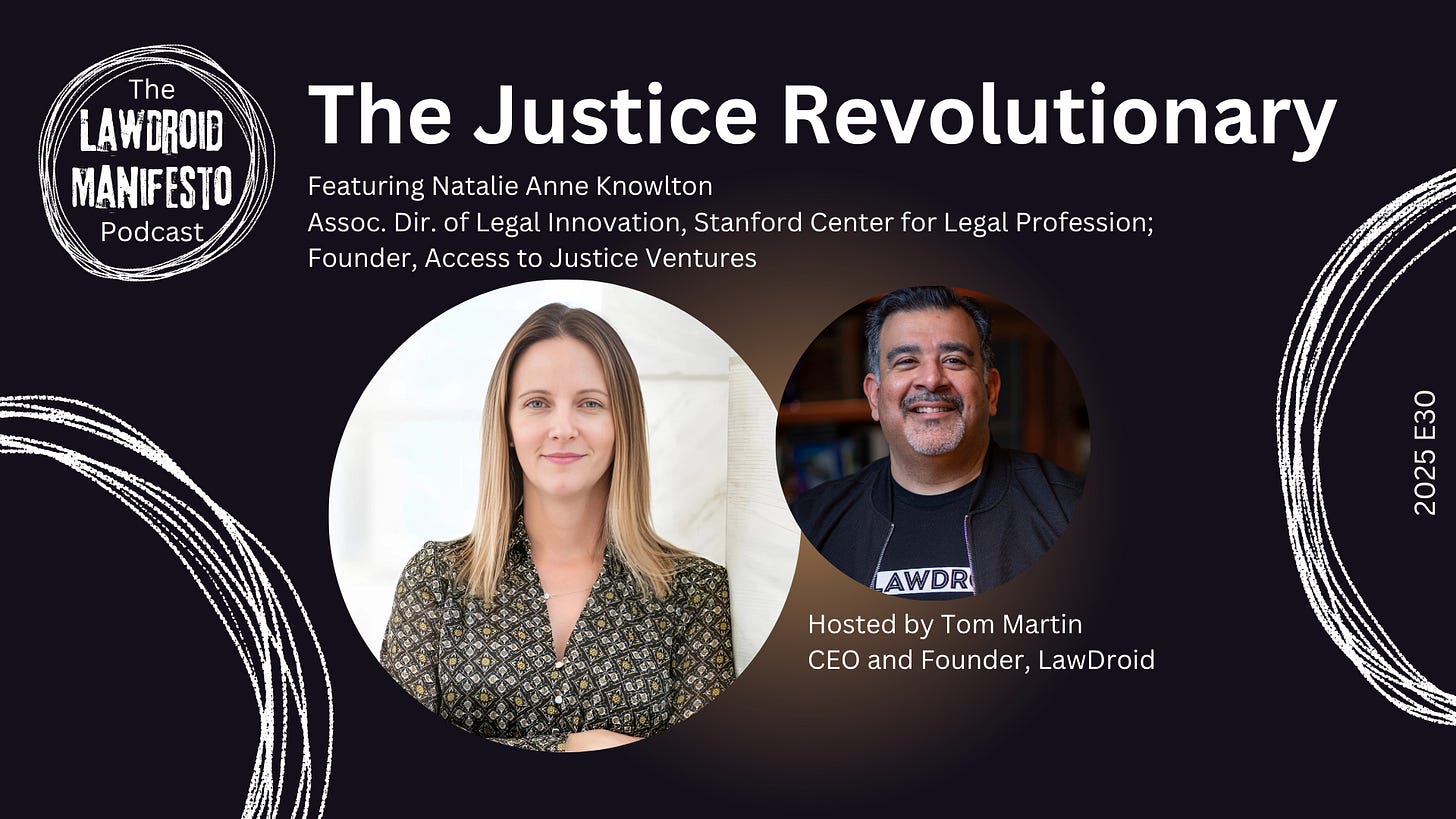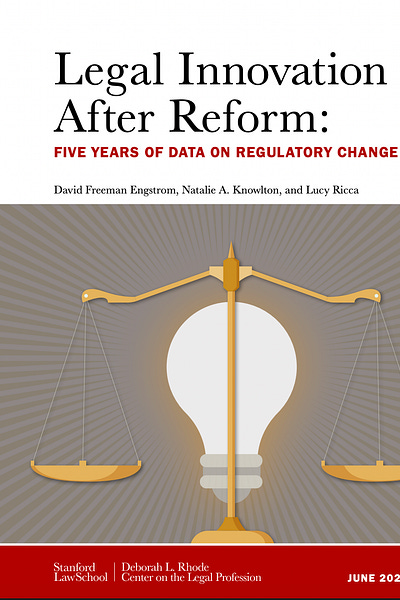Hey there Legal Rebels! 👋 I'm excited to share with you the 30th episode of the 2025 season of the LawDroid Manifesto podcast, where I will be continuing to interview key legal innovators to learn how they do what they do. I think you're going to enjoy this one!
If you want to understand how regulatory reform and entity-based approaches can revolutionize access to justice beyond just low-income populations, you need to listen to this episode. Natalie is at the forefront of legal regulatory reform and brings a uniquely comprehensive perspective from her extensive research and advocacy work.
Transforming Legal Access Through Regulatory Innovation
Join me as I interview Natalie Ann Knowlton, Associate Director of Legal Innovation at the Stanford Center on the Legal Profession and founder of Access to Justice Ventures.
In this insightful podcast episode, Natalie shares her remarkable journey from studying genocide and humanitarian law to becoming one of the most influential voices in access to justice reform. She dives deep into her groundbreaking research on Utah's regulatory sandbox and Arizona's entity regulation reforms, revealing how these innovations are creating new pathways for legal service delivery. Natalie also demonstrates how her 14 years at the Institute for the Advancement of the American Legal System shaped her understanding of systemic justice issues, particularly through her pivotal work on self-represented litigants in family law cases.
Her stories and insights underscore the critical need for regulatory reform that goes beyond traditional lawyer-centric models. This episode is a must-watch for anyone interested in the future of legal regulation and access to justice, offering valuable perspectives on how technology and regulatory innovation can democratize legal services for all income levels.
The Skinny
Natalie Ann Knowlton, Associate Director of Legal Innovation at Stanford Center on the Legal Profession, shares her evolution from a student fascinated by genocide studies to becoming an unapologetic advocate for access to justice reform. With 14 years at IAALS (Institute for the Advancement of the American Legal System), Natalie's perspective was fundamentally shaped by her research into self-represented litigants in family law cases, which she describes as her "radicalization moment."
Now through her consulting company Access to Justice Ventures and her research at Stanford, she's at the forefront of analyzing revolutionary regulatory approaches like Utah's legal sandbox and Arizona's entity regulation reforms. Natalie challenges the misconception that access to justice is only a low-income issue, arguing that legal services are prohibitively expensive for middle-income Americans as well. Her latest research shows minimal consumer harm from alternative legal service providers, with Utah reporting only 20 complaints against six-digit services delivered.
Throughout the conversation, Natalie emphasizes that regulatory reform isn't about eliminating ethical protections but removing economic barriers that prevent innovation in legal service delivery.
Key Takeaways:
• Access to justice affects far more than just low-income populations - middle-income Americans also struggle with legal costs due to net income realities and competing financial obligations
• Natalie's "radicalization" came through researching self-represented litigants in family law, where she discovered the devastating impact of inadequate legal resources on children and families
• Utah's regulatory sandbox and Arizona's entity regulation approaches show minimal consumer harm while dramatically expanding legal service options
• Entity regulation focuses on regulating the organization rather than individual roles, allowing for more innovative business models while maintaining ethical oversight
• Traditional Rule 5.4 restrictions on fee-sharing and co-ownership are economic barriers rather than ethical protections, as other rules already address independence and conflict issues
• AI technology may actually provide better legal information than the current "trash" available online, with hallucinations being less problematic than misleading blog content
• The definition of "practicing law" faces fundamental questions when applied to AI - whether technology can "practice" and who should be held accountable
• Consumer harm data from regulatory reform states shows approximately one complaint per 5,000+ services delivered, demonstrating the safety of alternative models
Notable Quotes:
"I always say it's an exciting time to be alive, often when it's not necessarily an exciting time. And I've been saying that phrase a lot these days." - Natalie Ann Knowlton (02:25-02:32)
"I think part of that, if I can just have a vulnerable moment, is I had just graduated from law school and grad school. I was in a relationship. I had a cat. So I had this animal and most people probably laugh and say, well, you can definitely leave the animal behind. But I didn't feel like I could." - Natalie Ann Knowlton (24:38-24:54)
"I thought the law was great when I was in law school and there were no systemic issues, at least none to speak of. And then I come to IELTS and realize that, oh my gosh, there's some real problems here." - Natalie Ann Knowlton (25:50-26:00)
"That's the point at which I say I was radicalized. I was very hesitant to go into that issue at IELTS because I thought divorce separation, I'm a product of divorce from a very young age. I don't want to learn about the what divorce does to children." - Natalie Ann Knowlton (29:23-29:40)
"The reality is that the legal system is insanely expensive, even for people like you and I making you and I kind of salaries and people. It's not necessarily the case." - Natalie Ann Knowlton (32:32-32:43)
"Income is really a bad way to assess whether or not someone can afford something. You need to look at what else they have to afford and what kind of trade-offs they're making with the money that they're bringing in." - Natalie Ann Knowlton (33:19-33:30)
"The Arizona Supreme Court essentially said that Rule 5.4, which is where the restriction lives on fee sharing and co-ownership, this is essentially an economic restriction. It's not an ethical prohibition." - Natalie Ann Knowlton (41:43-41:54)
"If you were familiar with the online resources available to litigants, you would probably think AI hallucinations are quite sophisticated because the information on the internet is largely trash." - Natalie Ann Knowlton (43:04-43:11)
Clips
How Utah and Arizona Are Transforming Law
Turbulence & Uncertainty in Legal Services
Access to Justice: It’s Not Just for the Poor
Chasing Change and the Cat Farm Dream
Natalie's journey from studying historical injustices to tackling contemporary legal system failures demonstrates how personal passion can drive systemic change. Her evolution from someone who "thought the law was great" in law school to becoming radicalized by family law research shows the power of confronting uncomfortable realities. Her work reveals that access to justice isn't just about helping the poor - it's about recognizing that our legal system's cost structure creates barriers for the vast majority of Americans.
What's particularly compelling is how Natalie's research provides concrete evidence that regulatory innovation works. The data from Utah and Arizona shows that fears about consumer harm from alternative legal service providers are largely unfounded, while the benefits in terms of increased access are substantial. Her analysis of Rule 5.4 as an economic rather than ethical restriction provides a clear framework for understanding why regulatory reform is necessary for meaningful progress.
Closing Thoughts
As someone who's spent years watching the legal profession grapple with access to justice challenges, I find Natalie's work both inspiring and essential. Her combination of rigorous academic research with passionate advocacy creates a powerful voice for change that the profession desperately needs.
What strikes me most about this conversation is Natalie's ability to challenge fundamental assumptions while backing up her arguments with data. The misconception that access to justice is only a "low-income issue" needed to be called out, and her personal experience with financial constraints despite a "good salary" makes the point personal and real.
The research on Utah's sandbox and Arizona's entity regulation provides concrete evidence that we can expand legal services without compromising consumer protection. When we see only 20 complaints against hundreds of thousands of services delivered, it becomes clear that the fears driving resistance to regulatory reform are largely unfounded.
For our Legal Rebels community, Natalie's story offers both a roadmap and encouragement. You don't need to start with grand plans to revolutionize the justice system - sometimes it begins with simply paying attention to the problems right in front of you, whether that's self-represented litigants in family court or the economic barriers preventing middle-class Americans from accessing legal help.
As regulatory reform continues to evolve across different states, those who understand both the research and the human impact - like Natalie - will be essential guides for creating a more accessible and equitable legal system. The revolution in legal services delivery is happening now, and voices like Natalie's are showing us the way forward.
Heres Natalie’s new report, “Legal Innovation After Reform: Five Years of Data on Regulatory Change,” which she co-authored with Stanford Law School’s David Freeman Engstrom and Lucy Ricca. It’s an update of the 2022 empirical study of the much-watched reform efforts in Arizona and Utah, providing fresh data and fresh perspective on the future of legal services. Here, Engstrom, Knowlton, and Ricca discuss the key findings and the broader implications for legal innovation.













